How to build Self confidence: Self confidence is tricky. Most people think that it helps us achieve our goals. But the truth is that self confidence helps us approach our goals differently. It makes us believe that something is possible so that we can put the best effort forward. If we don’t believe that something is possible, we won’t put any effort. Self confidence makes us approach things differently. Most importantly, it helps us start on our goals. In this article, we will talk about how to build self confidence with a few practical tips on starting something afresh.
Table of Contents
Self Confidence Meaning
What doesn self confidence mean?: I used to think that self confidence was mostly about blindly trusting your abilities. Thankfully, I’ve been corrected with some new material by the likes of Adam Grant. It doesn’t mean that you aren’t afraid of something. Self-belief doesn’t also mean that you should blindly trust your abilities when you don’t have the competence. Self confidence means that you’ll accept challenges, failures and truth as they are and work through them to achieve your goals.
So many times we are lost in feeling discouraged that we don’t have enough confidence to take a task. A strong reason is because of the wrong definitions of confidence that haunt us. We think that confidence is about our belief in the ability to achieve results. No, it is not. Self confidence is about the belief to give our best and do the most we can towards a goal.
This whole, goal based thinking attaches us too much to the result. Hence, we forge that the most fun we can have while doing something is by being immersed in it and working on it. If we don’t enjoy the journey, even if we get the results, they will lose their value. What’s the point in achieving something like that when you don’t feel that you’ve challenged yourself enough. If we feel confident about everything we do, then we are not challenging ourselves enough. So, stop worrying about this definition of confidence. Instead, focus on how committed you can be to do what’s required of you.
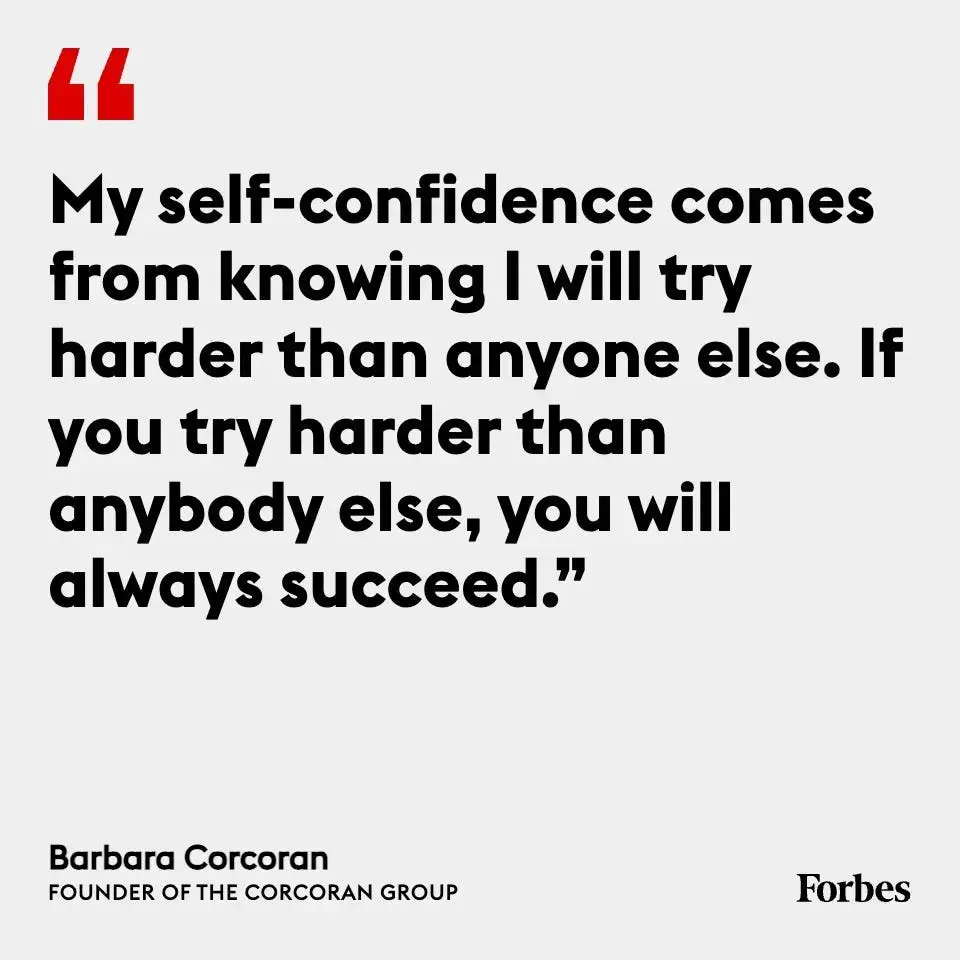
How to build your self confidence
With that background, let’s dive deep into how to build self confidence. It is not about how to be confident for a specific situation. Life is about consistency. The best results we are after will be about consistency. We must find a source within ourselves to help us feel confident to take on bigger challenges. We will never be sure of our results. So, let’s keep that ego aside and put ourselves out there. You will fail, it will feel horrible. But you can’t both protect yourself and achieve everything you want.
Failure is the essence of success. To feel confident, we must learn how to deal with failure and to overcome it. That’s how we build our self confidence – by becoming comfortable with failure and the debilitating effects of it. If you’re interested, here’s a short PPT on building self confidence for a free download: https://www.slideshare.net/spidyvinay/how-to-build-self-confidence-10-step?from_search=2
7 Practical Tips to build your self confidence
There’s no simple or easy way to build your self confidence. It will demand practice, repetition and challenging yourself on a daily basis. That’s the fun part – meaning that you can develop this confidence and help it to achieve bigger goals. Here are 7 practical tips to develop and build your self confidence.
Observe how your react to a challenge
When you face something new – observe how you react. Don’t judge or admonish yourself, but just observe. This observation tells you the truth. If you are afraid of the challenge, then that’s the truth. If you’re excited about its possibilities – that’s also the truth. The most important thing about building confidence is about being true to ourselves. Without that, nothing is possible.
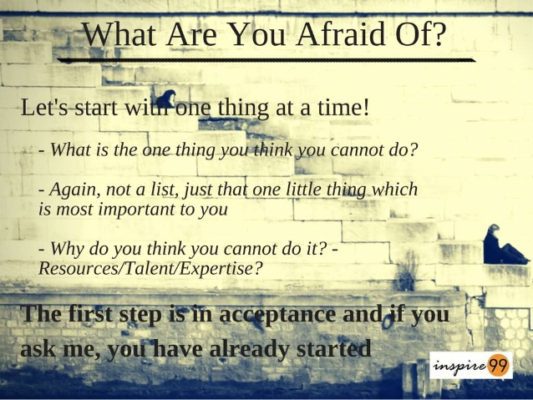
Question your response to the challenge
The second step to confidence building is to question why you are feeling a certain way. Sometimes, we respond to a situation because of a similar experience we have faced in the past. If so, take a pause and think about what in this particular challenge scares you. Remember, confidence comes from the ability to believe in your efforts and learn from the past. If the past failures or challenges bother you, then it means that your mind isn’t convinced that you haven’t found a way to resolve the challenges you faced in the past. Find a way to build that trust with your mind.
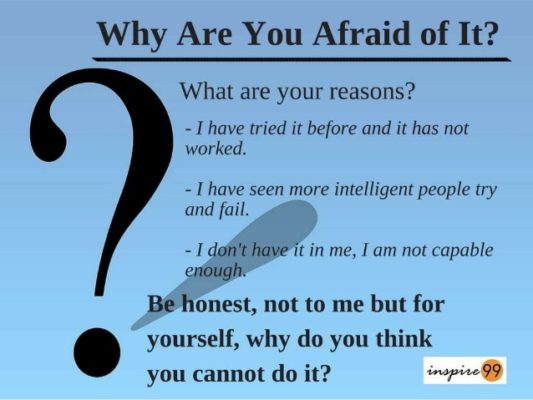
Lead with the desire and set achievable goals
Once you have your fears addressed, find your source of inspiration and the desire. This will help you sustain the motivation – both to achieve the goals and develop self confidence. Self confidence comes from achieving results. The best way you can do this is by breaking down your main goal into multiple tasks. If you are succeeding in a few, it gives you confidence that the overall goal has a better chance of success. We can only build confidence from success. Failure is important, but it can only give us feedback.
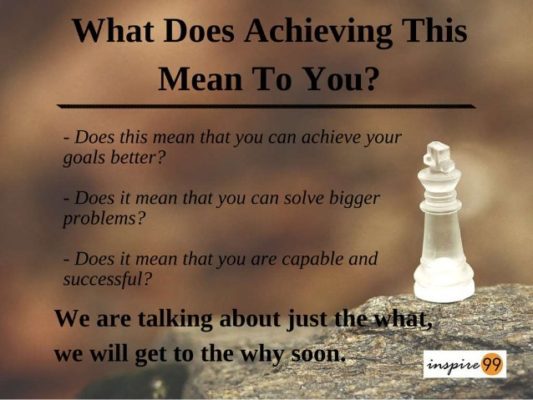
Identify your strengths and weaknesses
Both strengths and weaknesses are important factors. Identify these and be honest to yourself. To succeed or be confident, you don’t have to be great at everything. But you have to find a way to be honest and accept who you are. This means being brutally honest and facing your fears. But forget all that – this is about building your self confidence to succeed. Just focus on that. The moment you put it out there in public, you know what you are holding yourself accountable for.
Set realistic and measurable targets
Be kind on yourself – you cannot be an expert from Day 1. Every building was only a blueprint at some point. You are and will be a work in progress. Don’t forget that and set harsh targets. One of the most common reasons people struggle with self confidence is because they set unreasonable targets. See what you are doing with yourself. Question yourself and ask objectively whether it is a fair target. https://www.bitesizelearning.co.uk/resources/smart-goals-meaning-examples
Learn from failures and take feedback
You build self confidence with time – with lots of success and failures that come together. No one will have an unadulterated success or failure run. We will have both of them. But the problem is when we tend to overemphasise one over the other. If you want to build self confidence, you must tell your mind what you’ve learnt and how you’re going to change your approach based on it. Nothing beats self doubts better than progress does. Progress in fact is far better than perfection. It helps you move forward. And isn’t self confidence all about moving forward in life?
Don’t compare – your journey of self confidence is unique to you
This is the last and the most important point in building self confidence. Comparison kills your self belief and confidence. The moment you compare yourself, you’re being unfair on yourself because you’re comparing two completely different things. No wonder that your confidence gets hurt and makes you question your abilities.
Your journey is unique compared to someone else. You might want the same results, but you’ll never have the same opportunities, challenges or backgrounds as the other person. The whole comparison exercise is rigged and can only make you feel bad. This is the most important aspect of building self confidence – please don’t compare.
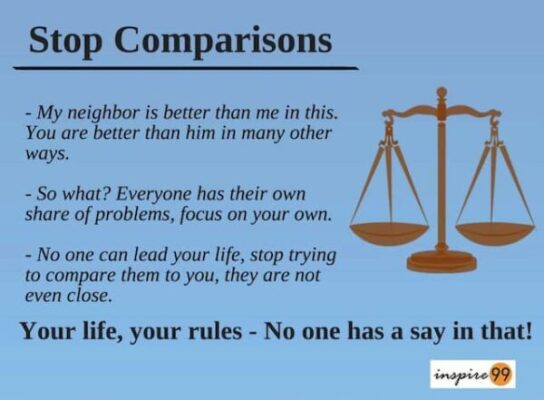
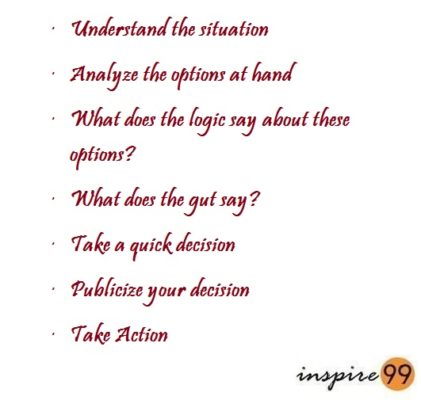
Pingback: You gain strength courage and confidence by every experience - Inspire99
Pingback: 3 ways to Boost Your Self Esteem, Pride and confidence - Inspire99
Pingback: 12 Quotes on Society to reflect your Individuality - Inspire99
Pingback: Whether You Think You Can Or Can’t You’re Right! - Inspire99
Pingback: He is an atheist who does not believe in himself! - Inspire99
Pingback: Roger Federer Quotes:Play With The Pain And More - Inspire99
Pingback: 10 Effective Tips on How to Deal with Gossips - Inspire99
Pingback: Should We Fake Confidence Or Accept Weakness? - Inspire99
Pingback: Only I can change My Life, No one - Carol Burnett - Inspire99
Pingback: 7 Quotes With A Punch of Life From Muhammad Ali - Inspire99
Pingback: Making mistakes is better than faking perfection - Inspire99
Pingback: Faith Is Taking The First Step Even When You Don't See The Whole StairCase - Inspire99
Pingback: No one can make you feel inferior without your consent! - Inspire99
Pingback: A man cannot be comfortable without his own approval - Mark Twain - Startup, Motivation
Pingback: Many people die at twenty-five & aren’t buried until seventy-five-Benjamin Franklin - Startup, Motivation
Pingback: How to Overcome Fear: 11 Practical Steps to face fears - Inspire 99
Pingback: When I discover who I am, I’ll be free - Ralph Ellison - Inspire 99
Pingback: 10 Inspiring Quotes about Failure, Meaning and motivation - Inspire 99
Pingback: Don't let someone tell you that you can't do something! - Inspire 99
Pingback: Our Doubts Are Our Traitors - William Shakespeare - Inspire 99
support on all managements
Indeed, the more I delve into this research, it makes me appreciate the challenge of listening. So many times leaders are under pressure to get things done that very little energy goes into active listening for real problems and solutions. No wonder so many companies get it wrong and to a stage where an external consultant is required to tell them to listen to their own employees to foster better collaboration
Motivational & value addition supports
Awesome Post Vinay Sir.Your mail id please sir. I need some personal stuff of motivation sir
Hi mate.. Sure, you can reach me at [email protected]. Also please copy on [email protected]. I might not be able to access the info email ID for a couple of weeks.
Happy to help mate :)
Cheers,
V
Awesome post Vinay, I guess self confidence is something which we all need badly… :)
Thanks Alok, always a pleasure to hear from you mate :)